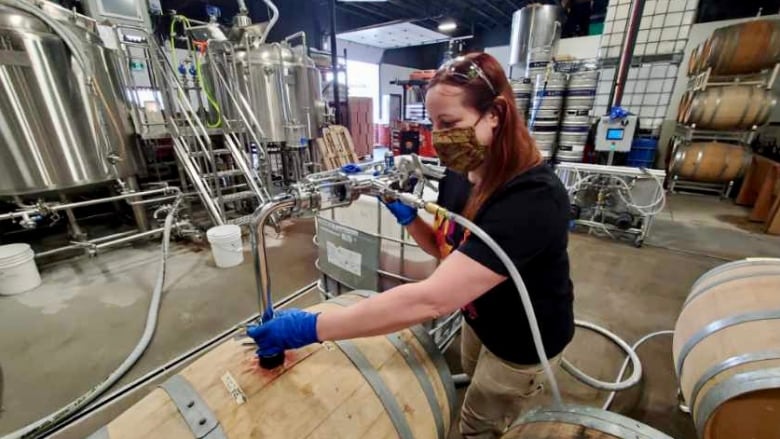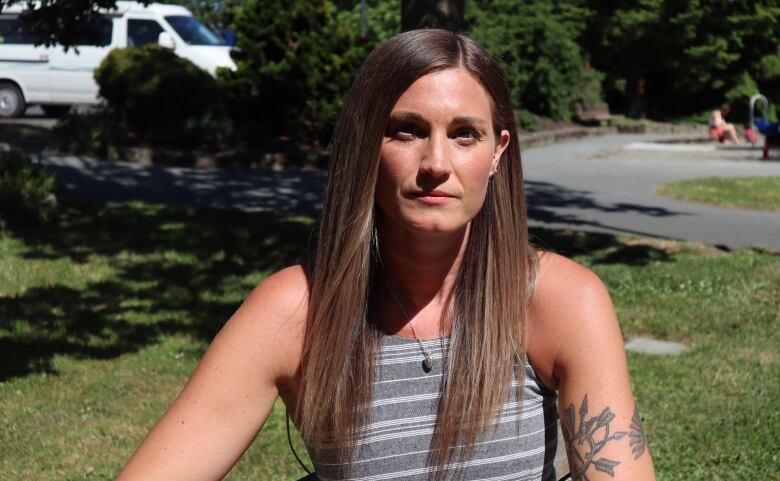The craft beer industry has been rocked by hundreds of stories of sexism, misogyny, abuse and assault against women that have come to light on social media — allegations that stand in stark contrast to the feel-good and friendly image the sector has long conveyed.

WARNING: This story contains details that some readers might find distressing.
As Jake Clark watched the #MeToo-style reckoning unfolding in the craft beer industry she went through a range of emotions — from heartbreak, to anger, to relief that she wasn’t alone in her experiences of systemic sexism, misogyny and violence in the beer world.
“There’s power in the conversations being brought forward and that light being shone into those dark corners,” said the B.C.-based beer consultant.
“It’s a relief to know that, OK, maybe there’s an opportunity here that we don’t just have to live this way.”
In the past few weeks, hundreds of stories have been collected on an Instagram account owned by Massachusetts brewery worker Brienne Allan, ranging from tales of daily microaggressions to disturbing claims of physical and sexual assault.
While many of the stories are anonymous and have not been verified, they’ve already led to high-profile resignations, including the founders of Modern Times and Tired Hands, two highly regarded U.S. breweries.
Clark and other women in the industry in Canada are now coming forward with their own experiences — allegations that stand in stark contrast to the feel-good image of friendliness, inclusivity and community the sector has long conveyed.

Clark posted a message on her own Instagram account last month that included a list of disturbing allegations of her own experiences, including sexual assault.
Many women have since contacted her with similar stories, thanking her for speaking out — but she says she’s also received abusive messages and threats.
‘You have to know 10 times more’
Clark, 38, says she has worked in the hospitality industry since her early teens, working her way up from dishwashing, with sexism and uncomfortable jokes along the way.
The most eye-opening experiences came when she became a manager, first at a beer bar and then at an importer. She saw how women in her team were treated by their male bosses — the sexist remarks about servers and kitchen staff, for example — and how she was treated by her fellow managers when she spoke out against it.
“You’ve either not been invited to the table anymore, you get told to shut up, you get told you need to take a joke, you get excluded from discussions,” she said.
“And you realize very quickly that as a woman, especially in beer, you have to know 10 times more than everybody else at the table for anyone to give you the time of day.”
Daily microaggressions are the most pernicious examples of misogyny and take a toll on mental health, women in the industry say — even those who have proven themselves to be among the best brewers in the country.
“Mostly it’s just being looked over or looked through and just sort of having to justify my existence in this industry,” said Julia Hanlon, head brewer of Steamworks Brewing Company in Burnaby, B.C.

Hanlon, 40, has worked in the industry for 16 years and won numerous awards while in charge of the Steamworks brewhouse.
She says she feels fortunate that she’s been treated equitably in the past by her employers.
But outside of her workplace — at out-of-town conferences or festivals, for example — she often has to explain that she’s the head brewer, not one of her male assistants.
“I think we’re at a point of reckoning where we’re saying, why is it that way? The number of high-profile breweries being called out for this type of behaviour is, hopefully, a sign of times changing.”
Report of assault dismissed
Women warn each other who to be careful around and discuss which events are safe to attend, Clark said. She hasn’t been to one event where something “wildly inappropriate” hasn’t happened, she added — whether that’s a comment, touching, or worse.
On one occasion early in her career, she says she was followed out of an event venue by a man she had been talking to. He forced himself on her and tried to kiss her; when she tried to push him off and told him to stop, he became aggressive and ripped off her skirt, she said.
When she tried to run away, he picked her up and threw her down a hillside bordering the street.
The next day, she says she saw the same man at another industry event and told an organizer what had happened. She recalls being told the man was part of event security and that he was a “good guy.”
Her bruises and scratches from the evening before were laughed off as a result of a fall from drinking too much, and the organizer said she had been seen being “flirty” with the man, implying she had led him on, she said.

“The impact of having gone to somebody and telling this terrifying thing that happened and them not only not believing me but actively protecting the person and allowing that person to be the security at the event, and to be blamed for my own injuries, was deeply scarring,” she said.
“It certainly made it clear that this sort of behaviour was tolerated and that reporting to anybody was a waste of time.”
Clark says she has not reported any of her experiences of abuse or assault to the police.
In Canada, just five per cent of sexual assaults are reported to police, according to a Statistics Canada report using data from 2014. Reasons include feeling powerless, shame, self-blame, a desire to move on, and a belief that reporting wouldn’t do any good, according to a Global News/Ipsos Reid poll from 2015.
Negative side of rapid growth
The systemic sexism in the craft beer world stems in part from its rapid success, Clark believes.
The number of breweries across the country almost doubled to 1,210 over the past five years, according to industry association Beer Canada. In B.C. alone, craft breweries and brewpubs employ 4,500 people and brought in $319 million in revenue in 2020, according to the provincial guild.
As a consultant, Clark has seen how many small breweries have scrambled to expand in order to cope with demand. With many owners lacking a background in running large teams, staff have been left unprotected.
“[There’s been] no time to put in place policy and procedures, or think about the responsibilities of running a business,” she said.
At the same time, there’s a notable lack of diversity in craft beer — a phenomenon that feeds itself as women, finding themselves unsupported amid systemic sexism, leave the industry.
No specific statistics on the Canadian industry exist yet. But in the U.S., a 2019 Brewers Association survey found only 7.5 per cent of brewers were women, and women made up 37 per cent of employees in “non-production” or “non-service” roles such as taproom manager or in marketing.
Steps forward
Natasha Peiskar has been developing calls to action since she began reading the stories surfacing online.
Peiskar, 35, a brewer at Establishment Brewing Company in Calgary, says she found the stories “traumatic” as she relived many of her own experiences in the industry since she started out in 2014.
As president of Pink Boots Canada, a non-profit that aims to help women in the industry through networking, education and scholarships, she’s vowing to “fight like hell” to bring change in the industry beyond “performative” statements of support for women.
“Don’t ask us for details, or if this has happened to us — spoiler: it has,” Peiskar said. “[And] don’t label yourself as an ally or the good guy.… You earn that s–t by your actions and words.
“Make sure that changes are intersectional as well, that we’re not leaving behind our BIPOC women, our LGBTQ community, our non-binary folks.”
Peiskar, Clark, Hanlon and other women in the industry have floated several suggestions of how breweries can help implement change, among them:
- Acknowledging there’s a serious problem with sexism in the industry.
- Having conversations with staff and offering a safe space for discussion.
- Making a public declaration of the company’s values.
- Creating a mandatory code of conduct for breweries who want to join an association or guild.
‘Significant issues within our industry’
Industry leaders, for their part, have acknowledged there’s a problem.
Last June, the Canadian Craft Brewers Association (CCBA) formed an anti-discrimination and inclusion committee, whose industry focus groups identified that “all forms of discrimination were significant issues within our industry,” CCBA chair Steve Beauchesne said.
The CCBA says it will soon be releasing an industry-wide employee survey to better understand diversity.
Women in the industry say the responsibility for change ultimately lies with men.
“Whether we like it or not, the people who are in positions of power and have the ability to make real change right now are the white straight men,” Clark said.
“If [they] get on board and start driving the change from the top, change is going to happen a lot more quickly.”
